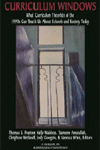
Curriculum Windows
What Curriculum Theorists of the 1990s Can Teach Us About Schools And Society Today
Edited by:
Thomas S. Poetter, Miami University
Kelly Waldrop, The Publish House
Tasneem Amatullah, Miami University, Oxford, Ohio
Cleighton Weiland, Miami University, Oxford, Ohio
Jody Googins, Miami University, Oxford, Ohio
Vanessa Winn, Miami University, Oxford, Ohio
A volume in the series: Curriculum Windows. Editor(s): Thomas S. Poetter, Miami University.
Published 2017
Curriculum Windows: What Curriculum Theorists of the 1990s Can Teach Us about Schools and Society Today is an effort by students of curriculum studies, along with their professor, to interpret and understand curriculum texts and theorists of the 1990s in contemporary terms. The authors explore how key books/authors from the curriculum field of the 1990s illuminate new possibilities forward for us as scholar educators today: How might the theories, practices, and ideas wrapped up in curriculum texts of the 1990s still resonate with us, allow us to see backward in time and forward in time – all at the same time? How might these figurative windows of insight, thought, ideas, fantasy, and fancy make us think differently about curriculum, teaching, learning, students, education, leadership, and schools? Further, how might they help us see more clearly, even perhaps put us on a path to correct the mistakes and missteps of intervening decades and of today? The chapter authors and editor revisit and interpret several of the most important works in the curriculum field of the 1990s. The book's Foreword is by renowned curriculum theorist William H. Schubert.
CONTENTS
Foreword, William H. Schubert. Preface—Learning to Navigate: The Editing Staff Reflects, Tasneem Amatullah, Jody Googins, Cleighton Weiland, Vanessa Winn, and Kelly Waldrop. Introduction—Curriculum Windows of the 1990s, Thomas S. Poetter. Three Decades of American-Style Sex Ed: Even Though Seasons Change, the View Out the Windows Remains the Same ... Time to Open the Door, Richelle Frabotta. Author/Book studied: Sears, J. (1992). Sexuality and the curriculum: The politics and practices of sexuality education. Our Children are Not for Sale: How the “Manufactured Crises” Has Commodified Our Public Schools and Students, Cleighton J. Weiland. Author/Book studied: Berliner, D., & Biddle, B. (1995) The Manufactured Crisis. The Stories of Ralph Tyler and Elliot Eisner: Contesting Accountability Job Creep in the Field of Curriculum, Kurtz Miller. Author/Book studied: Marsh, C., & Willis, G. (1995). Curriculum: Alternative approaches, ongoing issues. “Reflective Eclecticism”: In The Windows to Curricula, I See Myself, Thao A. Nguyen‐Horowitz. Author/Book studied: Posner, G. (1992). Analyzing the curriculum. The Lost Art of Deliberation, Ryan Graham. Author/Book studied: McCutcheon, G. (1995). Developing the curriculum: Solo and group deliberation. Understanding by Design: From Opacity to Transparency, Tasneem Amatullah. Author/Book studied: Wiggins, G., & McTighe, J. (1998). Understanding by design. Central Park East: The Power of Their Ideas and the Possibilities of School Change, Jody C. Googins. Author/Book studied: Meier, D. (1995). The power of their ideas. May I Have Coffee With You? What I Learned About Teaching From My Time Sitting in bell hooks’ Kitchen, Vanessa G. Winn. Author/Book studied: hooks, b. (1994). Teaching to transgress. Framing Dropouts or Framing Urban Schools? Are We the Problem Or Solution! Framing All My School Experiences, Crystal Phillips. Author/Book studied: Fine, M. (1991). Framing dropouts. Rethinking Multicultural Education for Authentic Emancipation, Loveness Ngorosha. Author/Book studied: McCarthy, C. (1990). Race and curriculum: Social inequality and the theories and politics of difference in contemporary research on schooling. Reflection on Multicultural Education: From Nationalism to Existential Aesthetics, Shaobing Li. Culturally Relevant Curriculum v. Culturally Irrelevant Curriculum: A Case of Cultures Restricted by Institutionalized Manipulation of Their Ethos(CRIME), Genesis R. Ross. Author/Book studied: Ladson‐Billings, G. (1994). Dreamkeepers. Subtractive Schooling: U.S.‐Mexican Youth and the Politics of Caring, Priscilla Tamankag. Author/Book studied: Valenzuela, A. (1999). Subtractive schooling: U.S.‐Mexican youth and politics of schooling and Nieto, S. (1990) The whites of their eyes. Integrated Curriculum: A Catalyst for Contextualized Learning, Jennifer Ellerbe. Author/Book studied: Beane, J. (1997). Curriculum integration: Designing the core of democratic education. About the Editors/Authors.
-
Paperback9781681237855
Web price: $45.04 (Reg. 52.99)
-
Hardcover9781681237862
Web price: $80.74 (Reg. 94.99)
- eBook9781681237879

-
 (Re)Envisioning Social Studies Education Research
Current Epistemological and Methodological Expansions, Deconstructions, and Creations
(Re)Envisioning Social Studies Education Research
Current Epistemological and Methodological Expansions, Deconstructions, and Creations
-
 Curriculum Windows
What Curriculum Theorists of the 2000s Can Teach Us About Schools and Society Today
Curriculum Windows
What Curriculum Theorists of the 2000s Can Teach Us About Schools and Society Today
-
 Curriculum Windows
What Curriculum Theorists of the 1960s Can Teach Us about Schools and Society Today
Curriculum Windows
What Curriculum Theorists of the 1960s Can Teach Us about Schools and Society Today
-
 Curriculum Windows
What Curriculum Theorists of the 1970s Can Teach Us about Schools and Society Today
Curriculum Windows
What Curriculum Theorists of the 1970s Can Teach Us about Schools and Society Today
-
 Curriculum Windows
What Curriculum Theorists of the 1980s Can Teach Us About Schools And Society Today
Curriculum Windows
What Curriculum Theorists of the 1980s Can Teach Us About Schools And Society Today
-
 Curriculum Windows
What Curriculum Theorists of the 1950s Can Teach Us About Schools and Society Today
Curriculum Windows
What Curriculum Theorists of the 1950s Can Teach Us About Schools and Society Today
-
 Curriculum Windows Redux
What Curriculum Theorists Can Teach Us About Schools and Society Today
Curriculum Windows Redux
What Curriculum Theorists Can Teach Us About Schools and Society Today

